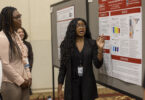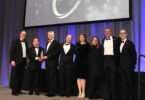Teaching can be hard, but a new collection of teaching tips written by UGA faculty members is helping make the job easier-and more fulfilling.
Chalk Talk: Teaching Tips from the UGA Teaching Academy is a collection of 69 essays on the nuts-and-bolts of classroom teaching. Edited by Loch Johnson, Regents Professor of Public and International Affairs and a member of the inaugural class of the Teaching Academy, the book is available for $24 at the UGA Bookstore.
Johnson had the idea for the book last year. In October, he sent out invitations for essays to every member of the UGA Teaching Academy and all winners of the Meigs and Russell awards for teaching. Then something remarkable happened: He received the submissions by the December deadline.
“I thought how wonderful it would be to tap into the experience of people here on campus. I know that as an instructor myself, I always like to read about other people’s techniques and hear about what really works for them in the classroom,” he said. “…a lot of senior faculty tell me they’ve learned a lot by reading these essays, and I have too. There are many wonderful gems here.”
The book was published earlier this year with financial support from the Office of the Provost. “This collection of essays offers college professors and graduate teaching assistants wonderful insights into what makes great teachers,” said Jere Morehead, senior vice president for academic affairs and provost. “I am pleased that our office could help, in a small way, to make this important publication possible.”
Unlike many other books on teaching, Chalk Talk doesn’t subscribe to an overall teaching philosophy or method. Instead, it’s a toolbox of useful practices or ideas that have helped others.
“Charles Bullock (professor of political science) wrote an essay about how he shows up to class early-five or 10 minutes before class starts. And he spends that time talking to students. It’s a wonderful thing to do because they get to know you, and you talk about their career aspirations and some of the problems they might be having in the course,” Johnson said. “And when you begin class there’s a kind of camaraderie there. There’s a bond between the students and professor that might not be there otherwise.”
Faculty from almost every college are represented in the book. Their essays range from implementing new technology into the classroom to tips on explaining complex topics, and how to better engage students. The only theme that runs throughout the book, Johnson said, is that it’s no longer adequate to stand up and deliver a long lecture in every class.
Fran Teague, English professor and member of the Teaching Academy’s executive committee, helped edit the book. She also contributed an essay entitled “Surrendering Control in the Classroom” about how she lets her classes choose what material they’ll cover and, to an extent, how they’ll be graded on it.
“It started because I had a class one year that was bugging me about the final exam. I said, ‘Well, what would you put on the final?’ hoping to shut them up. And what they thought I would put turned out to be so much more interesting and challenging than what I would have put on the final that we had to try it,” she said. “It’s one of the things that has surprised me, because it worked so well. It’s amazing how great our students can be if you let them be great.”








